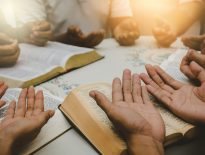It is said that God works through people. I am convinced that the people evoked in connection with my stellar moments—and I really would have liked to name them all—each contributed, in their own way, to my reunion with Divinity.
The moments that contributed to a person’s becoming are difficult to find and share in that person’s personal history, because most of them are infinitesimal, and the respective person may not be aware of them.
These moments are invisible, but decisive for the evolution of an individual, a people, or humanity—which is why Stefan Zweig calls them stellar. The others flow downhill, merging in the waters of this majestic river we call personal development—perhaps the most fascinating spectacle in the human world.
I felt the need for self-realization for the first time at the age of 17, under the incentive of a girl’s image: Alina Goreac, the best Romanian gymnast in 1968. Her image, taken during a balance beam exercise, sat on the cover of an issue of Sport magazine.
I was fascinated by the sepia photo, accompanied by an explanation that also mentioned Alina’s age: 16 years old. Only a year younger than me! At that moment, an unknown sensation of inner emptiness awoke in my soul, followed by the suspicion that I was wasting my life. Until then, all I had done was play with my ball from morning till night. And I read, especially when I was sick and had to stay home.
In any case, I felt that I had to do something with my life, to give it a higher purpose, to do significant things, like Alina Goreac, whom I perceived as someone who came out of the same generation as I did. I felt then, for the first time, a nostalgia for something that did not yet exist, but could exist: a nostalgia for a better version of me.
***
In 1969, towards the end of the 11th grade, my form-master, Gheorghe Niţu, organized a study trip to Bucharest, where we visited several faculties. It was a trip designed to orient us toward scholarship and a profession. For me it had the desired impact—not so much from a scholarly and professional point of view, but from a human one.
At the Polytechnic Faculty I saw some beautiful, fashionable, uninhibited, and friendly students. A first impression! At the Faculty of Philology, in the University square, in an impressive amphitheatre, we met the poet Ioana Diaconescu, a fourth-year student, and the lecturer Sorin Stati, whom we knew from his TV show “Sweet and Beautiful” about the correct use of the Romanian language. I was deeply impressed by the intellectual level of the two, manifested primarily in language—a correct and rigorous one, with abstract and non-redundant notions. Then I wanted to be like them!
On the way back, sitting in a bus and while my peers sang “student songs,” I was silently thoughtful, looking out the window at the darkness falling over the city. Professor Niţu came to me and asked me, worriedly, if I was feeling bad or upset. I felt neither bad nor was I upset; I was just deep in thought. The richness of that day’s experience had overwhelmed me, and a new project was born in my mind: to do everything in my power to be a student in a year’s time. And so, it happened…throughout the 12th grade, apart from attending school, I did nothing but read for the faculty.
If you asked me what I was reading or how I knew what to read, you would challenge me to tell you about another “stellar moment”. At the beginning of the 12th grade, on a sunny autumn day, I returned from school and, instead of entering the house, I stayed on the terrace, in the honey-like light of the October sun.
It just so happened that an interview with Professor Ștefan Georgescu, the dean of the Faculty of Philosophy at the University of Bucharest, at that time, was on the radio. It was the faculty I had chosen. Among other things, the professor read a list of philosophy works recommended to candidates. I wrote them all down and read them all!
Twenty candidates were competing for one spot. For the two written tests I came in second, and after the oral test, fourth. Without that moment on the terrace in Alexandria, I don’t know if I would have gone to college that year, or if I ever would have become a student at all. However, I know that that moment was at the origin of a series of events that made me become who I am today.
***
In the autumn of 1995, I was working for the Romanian Presidency, but I was also an associate professor in the Communication Sciences section of the School of High Political Studies, which was later to become the National School of Political and Administrative Studies (SNSPA).
One day, on the door of the secretariat, I saw an announcement about a competition for a position of university lecturer in social psychology. On the one hand, I rejoiced: I taught the psychosociology of communication; on the other hand, I thought that the position had been put up for competition for a person wanted by the management of the School and I did not want to ruin anyone’s arrangements. After the meeting, my colleague Cornel Codiţă, whom I knew as a student, suggested that we return together to the Cotroceni Palace, where he also worked as a counsellor.
On the way there I asked him if he knew for whom the position of lecturer had been put up. He didn’t know, but he asked me why I didn’t sign up. When I confessed my hesitation, Cornel pulled the car over, stopped the engine, looked me in the eyes, and said: “Remember what I’m telling you now: in this life, no one can take better care of you than you can”. That gave me courage, I entered the contest, I competed against a colleague, and we were both declared winners and a second position became available. Since then, I have been a teacher at SNSPA.
However, I could not forget Cornel’s words. He had touched a hidden spring, contradicted a very intimate conviction of mine, which I did not dare to confess: Someone up there pays attention to my thoughts and deeds, rebukes me for the bad and praises me for the good. In other words, I applied moral censorship in the name of a God whom I refused to acknowledge, in whom I claimed I did not believe, whom I had hidden deep down in my soul.
***
He was the God of my maternal grandmother, who, in the first seven years of my life, spoke to me about Him and His expectations of us. I would meet this God again much later, after meeting my wife, Corina Matei. We know from the Bible that God draws us to Him with the “cords of human kindness”. To me, Corina was such a cord. Through her I found Him, but I began to know Him when I first prayed fervently and felt a tender and protective warmth envelop me. It was the first gentle message that I was sure came from God.
It is said that God works through people. I am convinced that the people evoked in connection with my stellar moments—and I really would have liked to name them all—each contributed, in their own way, to my reunion with Divinity.
They traced my path back to God—a God who has loved and watched over me since childhood, when He called me by name, twice. But these moments are unrequitable…
Dumitru Borţun (69 years old) is a philosophy PhD and professor at the National School of Political and Administrative Studies in Bucharest (SNSPA). He is a specialist and a trainer in communication, and a founding member of the Romanian Public Relations Association.



















